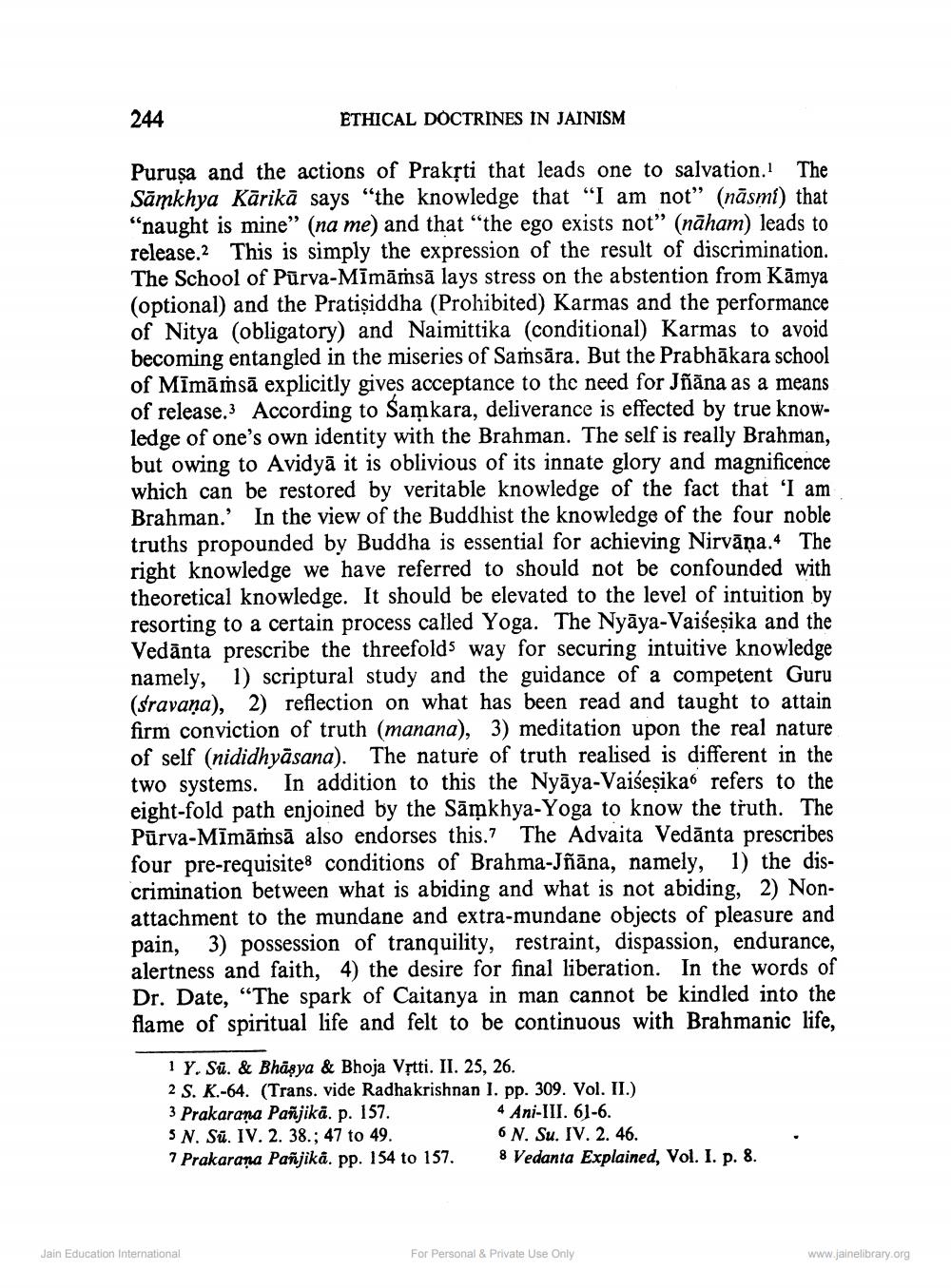________________
244
ETHICAL DOCTRINES IN JAINISM
Purusa and the actions of Praksti that leads one to salvation. The Sāmkhya Kārikā says "the knowledge that "I am not" (nāsmi) that "naught is mine” (na me) and that “the ego exists not" (nāham) leads to release. This is simply the expression of the result of discrimination. The School of Pūrva-Mīmāmsā lays stress on the abstention from Kāmya (optional) and the Pratişiddha (Prohibited) Karmas and the performance of Nitya (obligatory) and Naimittika (conditional) Karmas to avoid becoming entangled in the miseries of Samsāra. But the Prabhākara school of Mīmāṁsā explicitly gives acceptance to the need for Jñāna as a means of release. According to Samkara, deliverance is effected by true knowledge of one's own identity with the Brahman. The self is really Brahman, but owing to Avidyā it is oblivious of its innate glory and magnificence which can be restored by veritable knowledge of the fact that 'I am Brahman. In the view of the Buddhist the knowledge of the four noble truths propounded by Buddha is essential for achieving Nirvāņa.4 The right knowledge we have referred to should not be confounded with theoretical knowledge. It should be elevated to the level of intuition by resorting to a certain process called Yoga. The Nyāya-Vaiseșika and the Vedānta prescribe the threefolds way for securing intuitive knowledge namely, 1) scriptural study and the guidance of a competent Guru (sravaņa), 2) reflection on what has been read and taught to attain firm conviction of truth (manana), 3) meditation upon the real nature of self (nididhyāsana). The nature of truth realised is different in the two systems. In addition to this the Nyāya-Vaiseșika6 refers to the eight-fold path enjoined by the Sāmkhya-Yoga to know the truth. The Pūrva-Mīmāṁsā also endorses this. The Advaita Vedānta prescribes four pre-requisites conditions of Brahma-Jñāna, namely, 1) the discrimination between what is abiding and what is not abiding, 2) Nonattachment to the mundane and extra-mundane objects of pleasure and pain, 3) possession of tranquility, restraint, dispassion, endurance, alertness and faith, 4) the desire for final liberation. In the words of Dr. Date, “The spark of Caitanya in man cannot be kindled into the flame of spiritual life and felt to be continuous with Brahmanic life,
1 Y. ST. & Bhäsya & Bhoja Vịtti. II. 25, 26. 2 S. K.-64. (Trans. vide Radhakrishnan I. pp. 309. Vol. II.) 3 Prakarana Panjikā. p. 157.
4 Ani-III. 61-6. 5 N. Sü. IV. 2. 38.; 47 to 49.
6 N. Su. IV. 2. 46. 7 Prakarana Pañjika. pp. 154 to 157. 8 Vedanta Explained, Vol. I. p. 8.
Jain Education International
For Personal & Private Use Only
www.jainelibrary.org




